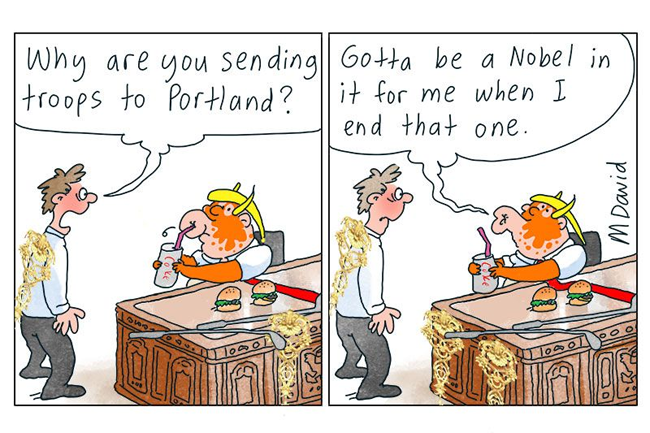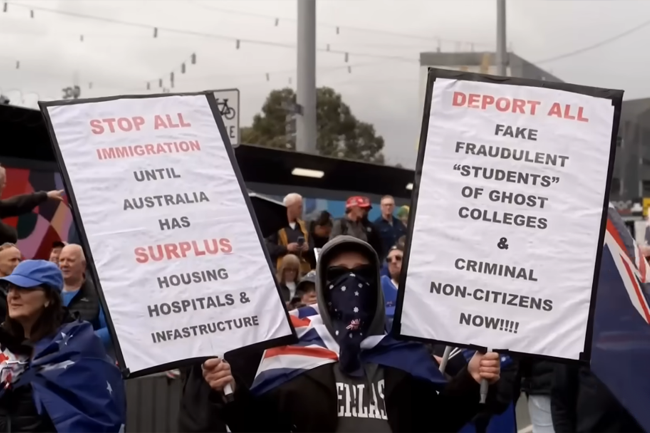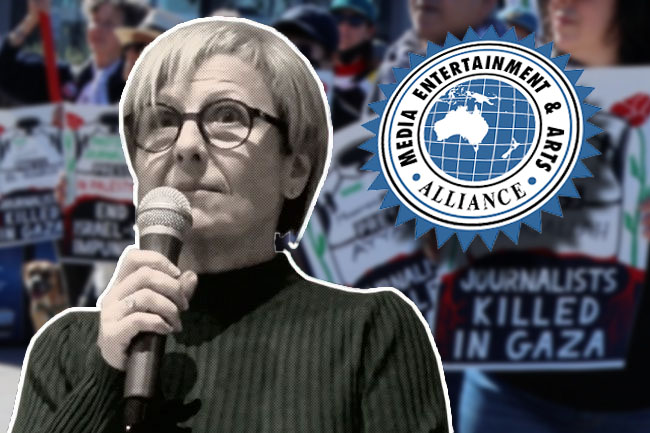Who’s running the country and where are they taking us? Dr Martin Hirst thinks the Canberra bubble is filling with gas.
IN THE LAST WEEK of March, right at the start of Australia’s response to the coronavirus pandemic, Prime Minister Scott Morrison announced the formation of the National COVID-19 Coordination Commission (NC-19CC). He said it would “solve problems” so “we all get through to the other side”.
Now, at the start of June, we have some idea of what the “other side” looks like according to the leading figures on the Coordination Commission. From what we can glean from the cheap seats in the bleachers, the future is going to be a gas — literally gas.
It’s hard to know, because, as Morrison said last week, cabinet decisions are not a “spectator sport”. We will be told when we’re told and not before. Now sit down and have some cheap gas.
Nobody should be terribly surprised by this outcome; it's the only one that the NC-19CC could conceivably come up with.
Why?
For a start, the NC-19CC is an energy sector lovefest.
The Commission chair is Neville (Nev) Power and he’s well connected to the Australian energy and mining industries. He is Deputy Chairman of Strike Energy Ltd and for nearly a decade was managing director and CEO of Fortescue Metals Group.
Catherine Tanna is the managing director of Energy Australia, ‘one of Australia’s leading electricity and gas retailers’ according to the helpful but rather anodyne biographies provided on the commission’s website.
The commission’s “special advisor” is the American chemical industry leader, Andrew Liveris, a former CEO and chairman of the Dow Chemical Company and on the board of a major Saudi oil company.
There are two other important members of NC-19CC: the head of the Department of Prime Minister and Cabinet, Phil Gaetjens and the head of Home Affairs, Mike Pezzulo. These are also political appointments — Gaetjens is a loyal fixer for Morrison and Pezzulo is Home Affairs Minister Peter Dutton’s lieutenant.
Who does the Commission report to?
Australians first heard of the Coordinating Commission when Morrison announced it at a media event on 25 March, but he didn’t tell us how the members were selected, or why, or by whom.
Presumably, it was a “captain’s pick” by Morrison.
Nearly three months later, that is still very opaque. The operations and deliberations of the NC-19CC have been folded into Morrison’s cone of cabinet secrecy and silence so that they are not subject to disclosure or serious public scrutiny.
We might never know what the National Cabinet and the COVID-19 commission are discussing because they are now embedded in the Canberra bubble and claiming immunity from public or journalistic scrutiny.
They don’t even want to be accountable to parliament.
In mid-May, the Senate select committee that is holding an ongoing inquiry into the Government’s response to the pandemic requested Mr Power come and chat with it, but he didn’t show up. Instead, the PM’s protector, Phil Gaetjens and Peter Harris, the CEO of the Commission, came to block any real scrutiny of the Commission.
All that the senators were able to learn was that there are no rules in place for managing conflicts of interest and that the Commission’s members and advisors were being handsomely paid for their time and service. According to the transcript, almost every other question was stonewalled.
Apparently, the commissioners are also recruiting other people “through their own networks” according to Phil Gaetjens, but who remain largely unknown to the public — to help across various things to do with the economy re-opening.
Greens Senator Peter Whish-Wilson grilled Phil Gaetjens about the advice the commissioners might provide, but the PM’s advisor would only say that most advice would be confidential.
This has not satisfied a coalition of public interest watchdog groups who collectively issued a statement calling for greater transparency round the discussions and decisions of the NC-19CC.
Serena Lillywhite, CEO Transparency International Australia, said:
“The level of influence of the NCCC cannot be understated. To date the level of transparency and accountability of this influential body has been opaque and could weaken our democracy without checks and balances in place.”
The public interest coalition called on the Government to properly establish the Commission through legislation that could be scrutinised in parliament. They have not had a response yet.
Since his appointment, Nev Power has been very selective about his media appearances, but we do know that he is pushing very hard for a resources-led recovery which basically means mining metals and fossil fuels.
This has become clearer in recent weeks, prompting Ben Oquist, executive director of The Australia Institute, suggest that the NC-19CC is “being used as a stalking horse to promote the gas industry in Australia”.
Mr Oquist adds that:
“Such a move would be disastrous both economically and for greenhouse gas pollution. It is time for the Commission to come clean and detail exactly what discussions it has had with the gas industry and what it is considering.”
Unfortunately, it isn’t going to happen that way.
The way forward has been set by Nev Power and the future is definitely going to be fossil fuel-led and gas-propelled.
Two stories in the Australian Financial Review merely 24 hours apart have made this clear.
On 20 May, AFR political editor Phil Coorey published an interview with Nev Power claiming ‘cheap gas will play a key role in Australia’s economic recovery’.
It’s worth noting what Mr Power said:
“In terms of gas, the critical thing is it is the mechanism that allows us to transition to baseload renewables in the fastest way,” Mr Power said.
As well, cheaper gas means cheaper electricity.
“The key is more supply,” he said.
Mr Power, who chairs the National COVID-19 Co-ordination Commission, said several options were under consideration, all with the common goal of entrenching a low gas price and lower costs for consumers and business.
So what about a potential conflict of interest then?
No worries, Phil Coorey dealt with it.
‘Mr Power's promotion of the development of onshore gas has prompted allegations of a conflict of interest, especially from within the anti-fossil fuel sector.’
See what he did there?
Phil Coorey thinks allegations of conflict of interest come only from opponents of gas — he mustn’t have seen the media release from the Public Interest Advocacy Centre that I quoted earlier.
I should mention that many environmental groups are concerned that the COVID-19 Commission is stacked with fossil fuel advocates, and with good reason.
Never mind, clever Phil let Nev Power deal with the allegation head-on:
Mr Power said he and other members of the commission, such as Energy Australia's Catherine Tanna and former Dow Chemical chief Andrew Liveris, had energy interests and made no secret of that.
"We have made it very clear, and we are very transparent, about our interests,'' he said, adding that the group had "processes" to take this into account.
Very good, then. Move on, shall we? Nothing to see here.
We can’t let it go. The problem for us is this: the “processes” mentioned by Mr Neville involve simply ignoring conflicts of interest and pretending they have no bearing on any decisions.
Phil Coorey was also able to ignore them because the day after he’d been told not to worry about it by Nev Power, the AFR political editor filed a follow-up story with a lead almost identical to the one from the day before:
‘Domestic gas will play an increasing role over coal in backing up the growing renewable energy sector over the next decade.’
The 21 May story was a nice little drop from Energy Minister Angus Taylor briefing the ever-reliable Mr Coorey about the Government’s “energy road map”, which was about to be released and had wonderful things to say about gas:
“Domestically gas will play an important role in balancing renewable energy, ramping up and down to match supply and demand.”
Given what we know and what we don’t know about the secret deliberations of the NC-19CC and the way its advice is managed by Morrison’s cabinet process, out of the sight of us mere spectators, we can only speculate about the coincidence between Mr Coorey’s stories and anything happening behind closed doors.
It must be really good being an insider; a player rather than a spectator.
Dr Martin Hirst is an Independent Australia columnist, a journalist, author and academic. You can follow him on Twitter @ethicalmartini.
 This work is licensed under a Creative Commons Attribution-NonCommercial-NoDerivs 3.0 Australia License
This work is licensed under a Creative Commons Attribution-NonCommercial-NoDerivs 3.0 Australia License
Support independent journalism Subscribe to IA.











